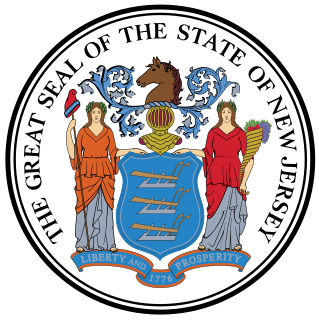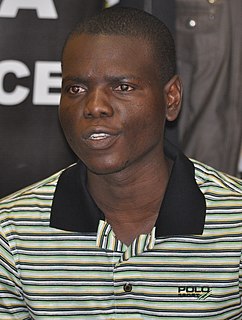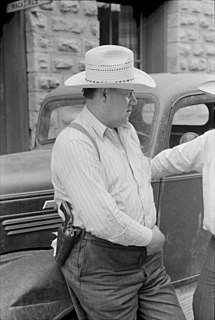
Politics of Niue takes place in a framework of a parliamentary representative democratic dependency, whereby the Chief Minister is the head of government, and of a non-partisan system. Niue is self-governing in free association with New Zealand and is fully responsible for internal affairs. New Zealand retains some responsibility for external affairs, in consultation with Niue. The Niue Constitution Act 1974 (NZ) vests executive authority in His Majesty the King in Right of New Zealand and the Governor-General of New Zealand. The constitution specifies that in everyday practice, it is exercised by a Cabinet of the Premier of Niue and three other ministers. The premier and ministers must be members of the Niue Assembly, the nation's legislative assembly. The Judiciary is independent of the executive and the legislature.

The politics of Zimbabwe takes place in a framework of a full presidential republic, whereby the President is the head of state and government as organized by the 2013 Constitution. Executive power is exercised by the government. Legislative power is vested in both the government and parliament. The status of Zimbabwean politics has been thrown into question by a 2017 coup.
A sheriff is a government official, with varying duties, existing in some countries with historical ties to England where the office originated. There is an analogous, although independently developed, office in Iceland that is commonly translated to English as sheriff.

The Constitution of South Africa is the supreme law of the Republic of South Africa. It provides the legal foundation for the existence of the republic, it sets out the rights and duties of its citizens, and defines the structure of the Government. The current constitution, the country's fifth, was drawn up by the Parliament elected in 1994 in the South African general election, 1994. It was promulgated by President Nelson Mandela on 18 December 1996 and came into effect on 4 February 1997, replacing the Interim Constitution of 1993. The first constitution was enacted by the South Africa Act 1909, the longest-lasting to date. Since 1961, the constitutions have promulgated a republican form of government.

The Scottish Courts and Tribunals Service (SCTS) is an independent public body which is responsible for the administration of the courts and tribunals of Scotland. The Service is led by a board which is chaired by the Lord President of the Court of Session, and employs over 1000 staff members in the country's 39 sheriff courts, 34 justice of the peace courts, the Court of Session and the High Court of Justiciary, and at the service's headquarters in Edinburgh. The day-to-day administration of the service is the responsibility of its Chief Executive and Executive Directors. The Scottish Courts and Tribunals Service is also responsible for providing administrative services for the Judicial Office for Scotland, the Office of the Public Guardian, the Accountant of Court, the Criminal Courts Rules Council, and the Scottish Civil Justice Council.

The Crown Office and Procurator Fiscal Service is the independent public prosecution service for Scotland, and is a Ministerial Department of the Scottish Government. The department is headed by His Majesty's Lord Advocate, who under the Scottish legal system is responsible for prosecution, along with the area procurators fiscal. In Scotland, virtually all prosecution of criminal offences is undertaken by the Crown. Private prosecutions are extremely rare.
The Electoral Commission is an independent Crown entity set up by the New Zealand Parliament. It is responsible for the administration of parliamentary elections and referendums, promoting compliance with electoral laws, servicing the work of the Representation Commission, and the provision of advice, reports and public education on electoral matters. The commission also assists electoral agencies of other countries on a reciprocal basis with their electoral events.

The Constitution of the State of New Jersey is the basic governing document of the State of New Jersey. In addition to three British Royal Charters issued for East Jersey, West Jersey and united New Jersey while they were still colonies, the state has been governed by three constitutions. The first was adopted on July 2, 1776, shortly before New Jersey ratified the United States Declaration of Independence and the second came into effect in 1844. The current document was adopted in 1947 and has been amended several times.

The Minister of Justice and Correctional Services is the justice minister in the government of South Africa. He is the political head of the Department of Justice and Constitutional Development (DoJCD), the Department of Correctional Services (DCS), and the Office of the Chief Justice. DoJCD is responsible for administrative support to the courts, oversight of the National Prosecuting Authority, the provision of legal services to departments of state, and law reform; and DSC is responsible for prisons and community corrections programmes.

The government of the U.S. State of Oklahoma, established by the Oklahoma Constitution, is a republican democracy modeled after the federal government of the United States. The state government has three branches: the executive, legislative, and judicial. Through a system of separation of powers or "checks and balances," each of these branches has some authority to act on its own, some authority to regulate the other two branches, and has some of its own authority, in turn, regulated by the other branches.

The Judicial Appointments Board for Scotland is an advisory non-departmental public body of the Scottish Government responsible for making recommendations on appointments to certain offices of the judiciary of Scotland. It was established in June 2002 on a non-statutory, ad hoc, basis by the Scottish Government, and was given statutory authority by the Judiciary and Courts (Scotland) Act 2008.

The Supreme Court is the highest court in the Kingdom of Spain. Originally established pursuant to Title V of the Constitution of 1812 to replace —in all matters that affected justice— the System of Councils, and currently regulated by Title VI of the Constitution of 1978, it has original jurisdiction over cases against high-ranking officials of the Kingdom and over cases regarding illegalization of political parties. It also has ultimate appellate jurisdiction over all cases. The Court has the power of judicial review, except for the judicial revision on constitutional matters, reserved to the Constitutional Court.
Manitoba Justice, or the Department of Justice, is the provincial government department responsible for administering the Crown Law justice systems in the province of Manitoba.

The present Constitution of Botswana commenced on September 30, 1966.

In the United States, a sheriff is an official in a county or independent city responsible for keeping the peace and enforcing the law. Unlike most officials in law enforcement in the United States, sheriffs are usually elected, although some states have laws requiring certain law enforcement qualifications of candidates. Elected sheriffs are accountable directly to the citizens of their county, the constitution of their state, and ultimately the United States Constitution.
The Commonwealth of Massachusetts is governed by a set of political tenets laid down in its state constitution. Legislative power is held by the bicameral General Court, which is composed of the Senate and House of Representatives. The governor exercises executive power with other independently elected officers: the Attorney General, Secretary of the Commonwealth, and Auditor. The state's judicial power rests in the Supreme Judicial Court, which manages its court system. Cities and towns act through local governmental bodies to the extent that they are authorized by the Commonwealth on local issues, including limited home-rule authority. Although most county governments were abolished during the 1990s and 2000s, a handful remain.

Scots law is the legal system of Scotland. It is a hybrid or mixed legal system containing civil law and common law elements, that traces its roots to a number of different historical sources. Together with English law and Northern Ireland law, it is one of the three legal systems of the United Kingdom.

The judiciary of Scotland are the judicial office holders who sit in the courts of Scotland and make decisions in both civil and criminal cases. Judges make sure that cases and verdicts are within the parameters set by Scots law, and they must hand down appropriate judgments and sentences. Judicial independence is guaranteed in law, with a legal duty on Scottish Ministers, the Lord Advocate and the Members of the Scottish Parliament to uphold judicial independence, and barring them from influencing the judges through any form of special access.
The New South Wales Department of Communities and Justice, a department of the Government of New South Wales, is responsible for the delivery of services to some of the most disadvantaged individuals, families and communities; and the administration and development of a just and equitable legal system of courts, tribunals, laws and other mechanisms that further the principles of justice in the state of New South Wales, Australia. It also provides services to children and young people, families, people who are homeless, people with a disability, their families and carers, women, and older people. The department is the lead agency of the Stronger Communities cluster of the New South Wales government.

The Office of the High Sheriff of Newfoundland and Labrador is a provincial law enforcement agency overseen by the Minister of Justice and Public Safety in the province of Newfoundland and Labrador, Canada. Founded in 1729, it is the oldest law enforcement agency in the province. Sheriffs are provincial peace officers appointed under the Sheriff's Act, 1991 with authority to enforce all relevant federal and provincial acts including the criminal code throughout Newfoundland and Labrador while in the lawful execution of their duties.












